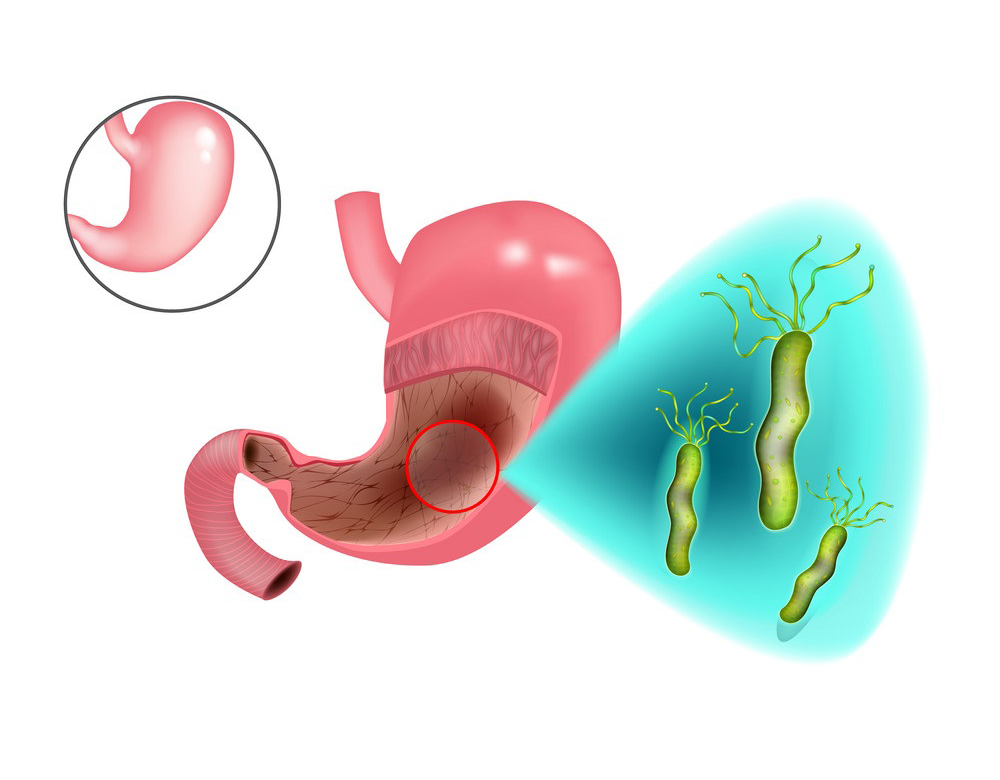H. Pylori
What is H. Pylori ?
H. pylori are a common bacterial infection of the stomach, intestines and throat since these germs enter your body and exist there. Often they live for years in the gut undetected till they cause ulcers and sores and sometimes stomach cancers. H pylori infection is common among kids and adults, too, with nearly 2/3 of the global population being asymptomatic and having the bacteria in their bodies.
In most cases, even ulcers do not occur, and treatment using antibiotics is sufficient. Good eating habits, quitting smoking and alcohol, stress management, clean food, water and sanitisation are essential to keeping H. pylori infection at bay.

What are the causes of H. Pylori?
For many years it was thought the cause of ulcers was smoking, stress, lifestyle habits, etc. In 1982 it was discovered that the H. pylori bacteria and helicobacter pylori infection germs caused most of the ulcers.
H. pylori infections may arise from the water, food, contaminated utensils and poor sanitary measures. Generally, it is transmitted through saliva and the infected person’s body fluids. Most people catch the infection during childhood, and the infection can go undetected for many years. It is also unclear why some people develop severe ulcers while others may remain asymptomatic and ulcer-free.
What are the symptoms of H. pylori ?
H pylori treatment: Gastric ulcers, stomach cancers etc., due to H Pylori, may show up as dull or burning stomach pains that come and go, especially between meals and when resting at night. The symptoms generally subside with an antacid, a glass of milk or a light snack.
The H. pylori symptoms may include:
- Burping
- Nausea
- Bloating
- No hunger
- Vomiting
- Heartburn
- Swelling and pain in the belly
- Eating small amounts of food to feel full
- Weight loss due to unclear reasons
How is H Pylori Diagnosed?
Doctors will test for H. pylori if you have ulcer symptoms or have a past history. This generally includes the following and is symptoms based.
Physical Exam: The doctor generally will check symptoms, medical history and medications taken. The physical examination of your belly may involve checking for pain, swelling and tenderness by applying hand pressure on the belly region.
The doctor may order tests to check for H pylori infection, which include:
- Blood tests for anaemia like the haemoglobin and RBC count.
- Faecal occult blood test to detect bleeding in the stools.
- A urea breath test may be conducted where you drink a urea formulation and breathe into a bag for breath analysis. H Pylori bacteria convert urea into CO2, and hence higher volumes of the carbon-di-oxide typically indicate H Pylori infection.
If the doctor suspects H pylori infection connected to ulcers or stomach cancers, he may also order:
- Upper GI endoscopy: A small tube with a camera is inserted into the throat, stomach and intestines. The test is not painful and generally conducted when you are awake but comfortable.
- Upper gastrointestinal- GI Barium test: You will drink a Barium formulation and have an X-ray. The coating of Barium provides better X-ray images.
- CT- Computerized Tomography or MRI- Magnetic Resonance Imaging scans: The non-invasive tests are high-resolution x-rays of the inside of your body.
Although medical advice and treatment plans for H. pylori depend on the test results, you will be advised to cease alcohol consumption, smoking, eating spicy foods, overeating, exercising after meals, avoiding stressful situations and not resting/ sleeping well.
What is the treatment for Helicobacter Pylori ?
If you have ulcers caused by H. pylori, the treatment involves healing the ulcers/ stomach lining, killing the bacterial infection and preventing reoccurrence. Generally, it is 1-2 weeks and taking nearly 12-14 tablets a day before you feel an improvement.
Doctors will prescribe several drugs to help with different symptoms and Helicobacter Pylori treatment which may be
- Antibiotics to kill the bacterial infection using amoxicillin, tetracycline, metronidazole, clarithromycin, tinidazole etc. Generally, 2 of these are used.
- Stomach acid reduction drugs like esomeprazole, dexlansoprazole, omeprazole, rabeprazole, pantoprazole etc.
- Sometimes Bismuth subsalicylate may be used with antibiotics.
- Histamine blockers like ranitidine, cimetidine, nizatidine, cimetidine or famotidine.
